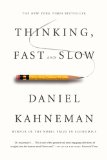Summary | Excerpt | Reviews | Beyond the Book | Readalikes | Genres & Themes | Author Bio

Critics' Opinion:
Readers' Opinion:
First Published:
Oct 2011, 512 pages
Paperback:
Apr 2013, 512 pages
 Book Reviewed by:
Book Reviewed by:
Beverly Melven
Buy This Book
The use of such language is considered a sin in the professional circles in which I travel, because it seems to explain the thoughts and actions of a person by the thoughts and actions of little people inside the person's head. Grammatically the sentence about System 2 is similar to "The butler steals the petty cash." My colleagues would point out that the butler's action actually explains the disappearance of the cash, and they rightly question whether the sentence about System 2 explains how products are calculated. My answer is that the brief active sentence that attributes calculation to System 2 is intended as a description, not an explanation. It is meaningful only because of what you already know about System 2. It is shorthand for the following: "Mental arithmetic is a voluntary activity that requires effort, should not be performed while making a left turn, and is associated with dilated pupils and an accelerated heart rate."
Similarly, the statement that "highway driving under routine conditions is left to System 1" means that steering the car around a bend is automatic and almost effortless. It also implies that an experienced driver can drive on an empty highway while conducting a conversation. Finally, "System 2 prevented James from reacting foolishly to the insult" means that James would have been more aggressive in his response if his capacity for effortful control had been disrupted (for example, if he had been drunk).
System 1 and System 2 are so central to the story I tell in this book that I must make it absolutely clear that they are fictitious characters. Systems 1 and 2 are not systems in the standard sense of entities with interacting aspects or parts. And there is no one part of the brain that either of the systems would call home. You may well ask: What is the point of introducing fictitious characters with ugly names into a serious book? The answer is that the characters are useful because of some quirks of our minds, yours and mine. A sentence is understood more easily if it describes what an agent (System 2) does than if it describes what something is, what properties it has. In other words, "System 2" is a better subject for a sentence than "mental arithmetic." The mind - especially System 1 - appears to have a special aptitude for the construction and interpretation of stories about active agents, who have personalities, habits, and abilities. You quickly formed a bad opinion of the thieving butler, you expect more bad behavior from him, and you will remember him for a while. This is also my hope for the language of systems.
Why call them System 1 and System 2 rather than the more descriptive "automatic system" and "effortful system"? The reason is simple: "Automatic system" takes longer to say than "System 1" and therefore takes more space in your working memory. This matters, because anything that occupies your working memory reduces your ability to think. You should treat "System 1" and "System 2" as nicknames, like Bob and Joe, identifying characters that you will get to know over the course of this book. The fictitious systems make it easier for me to think about judgment and choice, and will make it easier for you to understand what I say.
Speaking of System 1 and System 2
"He had an impression, but some of his impressions are illusions."
"This was a pure System 1 response. She reacted to the threat before she recognized it."
"This is your System 1 talking. Slow down and let your System 2 take control."
Thinking, Fast and Slow Copyright © 2011 by Daniel Kahneman





The Flower Sisters
by Michelle Collins Anderson
From the new Fannie Flagg of the Ozarks, a richly-woven story of family, forgiveness, and reinvention.

The House on Biscayne Bay
by Chanel Cleeton
As death stalks a gothic mansion in Miami, the lives of two women intertwine as the past and present collide.

The Funeral Cryer by Wenyan Lu
Debut novelist Wenyan Lu brings us this witty yet profound story about one woman's midlife reawakening in contemporary rural China.
Your guide toexceptional books
BookBrowse seeks out and recommends the best in contemporary fiction and nonfiction—books that not only engage and entertain but also deepen our understanding of ourselves and the world around us.